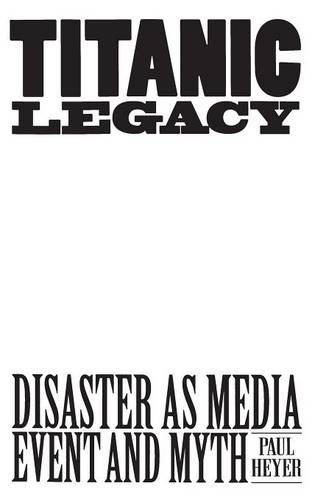
TITANIC LEGACY: Disaster as Media Event and Myth
(Hardback)
Publishing Details
TITANIC LEGACY: Disaster as Media Event and Myth
By (Author) Paul Heyer
Bloomsbury Publishing PLC
Praeger Publishers Inc
30th October 1995
United States
Classifications
Tertiary Education
Non Fiction
Public health and preventive medicine
Maritime history
363.123091634
Physical Properties
Hardback
200
Width 156mm, Height 235mm
510g
Description
This is the first book to deal exclusively with the influence and meaning of what media historian Paul Heyer calls our century's first collective nightmare. Using contemporary as well as archival sources, he explores a series of intriguing questions: Why has the TITANIC disaster affected the way we think about ourselves and our technology How has the media made it into a morality play of mythic dimensions What impact has that story had on the development of 20th-century communications This timely and compelling book pays homage to the TITANIC's fateful voyage by attempting to explain not why she struck an iceberg on a cold April night in 1912, but what is surely her greatest enigma: the hold the event still has over us. Heyer assesses the impact of the TITANIC disaster on the 20th century by exploring the relationship between the event and a variety of media from 1912 to the present. The role of the media in the disaster begins with the TITANIC's distress call. Only a partial success, it resulted in a concerted plea for more wireless regulation. Subsequent newspaper coverage called the sinking the story of the century. The mad scramble for information led to the use of every possible journalistic technique, ethical or otherwise. In his analysis, Heyer puts particular emphasis on the New York Times, which became the paper of record and achieved international prominence for its accurate and sometimes controversial reporting. As soon as press coverage subsided, the TITANIC tragedy resurfaced in literature and film. It has gone on to become one of the most enduring myths in 20th century popular culture. Heyer examines this phenomenon, and shows us how and why, following the discovery of the wreck (1985) and the Challenger disaster (1986), our obsession with the TITANIC has been greater than at any other time since 1912. This is a unique and provocative book that will appeal to readers interested in popular history, media studies, and American studies.
Reviews
.,."well-written and unique book."-Choice
...well-written and unique book.-Choice
A wide-ranging assessment of how and why the sinking of the TITANIC has remained a perdurable part of the West's sociocultural heritage....Engrossing and original perspectives on a maritime misfortune that retains its fascination deep into the space age.-Kirkus Reviews
For decades, disaster has been synonymous with the name Titanic, but by now very few people are left who actually remember the sinking of the "unsinkable" ship. Heyer traces the actual events of the sinking, the event's heroes and villains, and how the disaster was reported in the various media. Heyer traces Titanic tributes in music and films, such as A Night to Remember, and he brings up for discussion the ongoing controversy over whether the doomed ship's orchestra actually played "Nearer My God to Thee" while descending below the waves.-Booklist
Paul Heyer has taken upon himself the seemingly impossible task of presenting a fresh persective on the 1912 Titanic disaster. Against all odds and the hundreds of books and articles written on the topic since Titanic went to her watery grave, he succeeds. His book is well written and a particular "must-read" for anyone interested in how media events are transformed into modern myth...Titanic Legacy is a volume that should appeal to general readers interested in early 20th century maritime history and technological innovations as well as to Titanic enthusiasts.-Steamboat Bill
...well-written and unique book.Choice
..."well-written and unique book."-Choice
"A wide-ranging assessment of how and why the sinking of the TITANIC has remained a perdurable part of the West's sociocultural heritage....Engrossing and original perspectives on a maritime misfortune that retains its fascination deep into the space age."-Kirkus Reviews
"For decades, disaster has been synonymous with the name Titanic, but by now very few people are left who actually remember the sinking of the "unsinkable" ship. Heyer traces the actual events of the sinking, the event's heroes and villains, and how the disaster was reported in the various media. Heyer traces Titanic tributes in music and films, such as A Night to Remember, and he brings up for discussion the ongoing controversy over whether the doomed ship's orchestra actually played "Nearer My God to Thee" while descending below the waves."-Booklist
"Paul Heyer has taken upon himself the seemingly impossible task of presenting a fresh persective on the 1912 Titanic disaster. Against all odds and the hundreds of books and articles written on the topic since Titanic went to her watery grave, he succeeds. His book is well written and a particular "must-read" for anyone interested in how media events are transformed into modern myth...Titanic Legacy is a volume that should appeal to general readers interested in early 20th century maritime history and technological innovations as well as to Titanic enthusiasts."-Steamboat Bill
Author Bio
PAUL HEYER is Professor of Communication at Simon Fraser University, Burnaby, British Columbia. His previous books include Nature, Human Nature, and Society (Greenwood, 1982) and Communications and History (Greenwood, 1988). He is coeditor of Communication in History: Technology, Culture, and Society.
